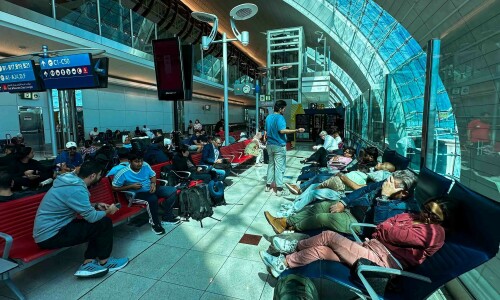
Prof John L Esposito is a professor of Religion and International Relations and Islamic Studies at Georgetown University in Washington DC. He has written extensively on Islam, political Islam and Islamophobia, and is also the founding director of the Alwaleed Centre for Muslim-Christian Understanding at Georgetown. He has also won several awards, including Pakistan’s Quaid-i-Azam Award for Outstanding Contributions in Islamic Studies. Dawn caught up with Mr Esposito in Islamabad to discuss his work.
Q: What made you interested in political Islam?
A: I was in a monastery when I was young, became a Catholic theologian and did my degree in theology. I went to Temple University for a doctorate and I intended to major in Catholic studies with a minor in two other religions. I was finishing a degree in Hinduism when the department chairman said they were hiring a new scholar and that I would need to take a course on Islam.
I began to see social movements when I started to travel and research. There was the Muslim Brotherhood in Egypt, a group called ABIM in Malaysia and the Jamaat-i-Islami in Pakistan.
I began to see the movement as both social and political. The real thing to me was the Iranian Revolution, because without that I would not have gotten a job teaching Islam.
I got involved in explaining the Iranian Revolution and its impact and focused on how these movements come about. The two major movements that emerged in the 30s and 40s were the Brotherhood in Egypt and the Jamaat here. Most people who were trained in Islam were your classic Orientalists – people who worked in classic texts and languages. I was doing modern contemporary work that not a lot of people were doing. There was a [demand for it] and after the Iranian Revolution, I had three book contracts in five weeks.
Nothing caught people’s attention like the Iranian Revolution. People forgot that you had the oil embargo by the Saudis before that. Even in terms of governments, because Iran also had governments focusing more on the Middle East.
Q: How do you differentiate between Islam the religion and Islam as political?
A: There is the faith of Islam to which 1.6 or 1.7 billion people belong, and religiously informed social and political movements have formed within that in the last decades of the last century. We had them in the 18th and 19th centuries as well but none of that was newsworthy or seen to have global significance.
I distinguish between Islam the religion and its practice, and within Islam, you have social movements that are not political and you have sociopolitical movements that are political. And we debate on what to call them. I use Islamic movements, others use Islamist movements. There is a critical distinction here, one I think the [current US presidential administration] and many analysts don’t make, between mainstream movements and extremists.
A lot of people say there is no distinction, that you have violent terrorist movements and other movements they call ‘wolves in sheep’s clothing’. I think that is the logic many authoritarian regimes – Mubarak, Ben Ali and others – gave the American administration and the Europeans, which was that they can provide security and stability and the movements are terrorist or potential terrorists.
Q: The Arab Spring revolutions did not start out as Islamic political movements – why do you think they resulted in electoral victories for Islamists?
A: One of the things that played to the advantage of the Brotherhood and to Ennahda was that they were seen as the main groups that stood up to the government and were clean in terms of corruption. In most cases, there were no other strong movements.
Another advantage was that an incredible number of political parties showed up close to the elections. Some of these new parties in Egypt and Tunisia had very few people, some were run by people with a certain reputation and did not have the sense to build from below when elections came.
These movements were drawing not only their followers but also those who had no other place to express their opposition.
Q: How has the prominence of political Islam changed since you entered the field?
A: Islamic movements or those which were mainstream emerged in many countries, and in countries like Egypt we had former members of the Muslim Brotherhood who thought the Brotherhood was too moderate because it did not take to the streets. For example, the current Al Qaeda leader, Zawahiri, was in the Brotherhood but was turned off to it and became one of the founders of a militant movement.
The next watershed movement was the emergence of Al Qaeda, because you begin to see a global movement. The other movements, like the Jamaat in Pakistan, were not attracting people from other countries into them like a global membership.
You cannot underestimate 9/11 because the US never knew such a threat. All the ‘great enemies’ that the US faced, they faced in other countries. And then came the global threat when President Bush declared this was a global war on terrorism.
Groups like ISIS emerge and it becomes like natural selection. People thought that it will be over when Khomeini died, that Al Qaeda will disappear when Bin Laden died. But Al-Qaeda did not disappear, instead, ISIS came along.
When and if ISIS is defeated, unless the political conditions and the nature of regimes in many of these countries change, it is inevitable that there will be an explosion.
Published in Dawn, April 27th, 2017














































Dear visitor, the comments section is undergoing an overhaul and will return soon.